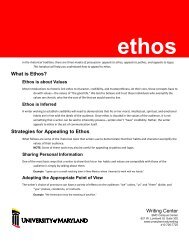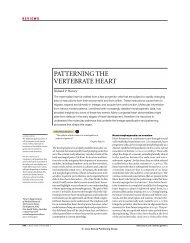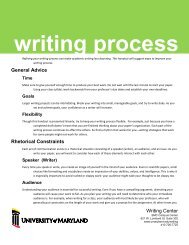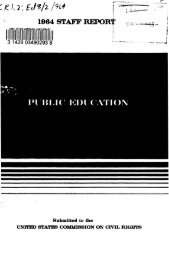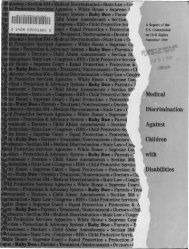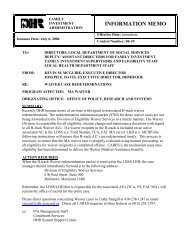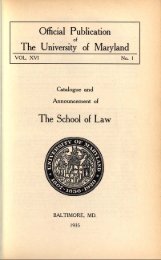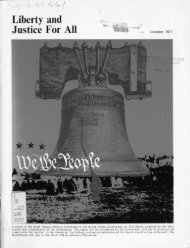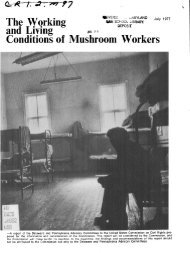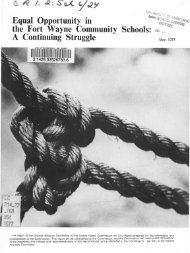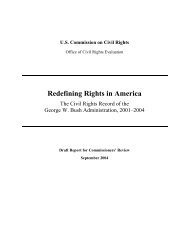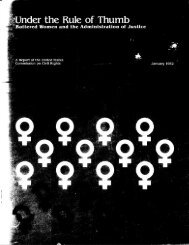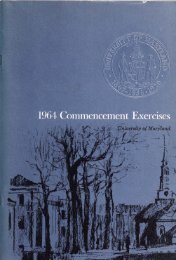1961 US Commission on Civil Rights Report Book 2 - University of ...
1961 US Commission on Civil Rights Report Book 2 - University of ...
1961 US Commission on Civil Rights Report Book 2 - University of ...
Create successful ePaper yourself
Turn your PDF publications into a flip-book with our unique Google optimized e-Paper software.
given authority to call an electi<strong>on</strong> <strong>on</strong> the questi<strong>on</strong>, and thereafter to<br />
suspend the operati<strong>on</strong> <strong>of</strong> <strong>on</strong>e or more, or all, <strong>of</strong> the public schools under<br />
their jurisdicti<strong>on</strong>.<br />
Georgia and Louisiana enacted similar statutes in <str<strong>on</strong>g>1961</str<strong>on</strong>g> *° establishing<br />
local opti<strong>on</strong> procedures for the closing and reopening <strong>of</strong> public schools<br />
in desegregati<strong>on</strong> crises. The Louisiana statute was found unc<strong>on</strong>stituti<strong>on</strong>al<br />
by a three-judge court <strong>on</strong> August 30, ig6i. 41<br />
By early 1959 compulsory school-closing laws had proven vulnerable<br />
to c<strong>on</strong>stituti<strong>on</strong>al attack in the courts. Schools in both Virginia and<br />
Arkansas were reopened after the courts struck down the laws under<br />
which they were closed; and the emphasis <strong>of</strong> subsequent legislati<strong>on</strong>, by<br />
and large, shifted to new strategies <strong>of</strong> resistance. 42 School-closing laws<br />
<strong>of</strong> the local opti<strong>on</strong> variety retain sufficient importance to warrant an<br />
examinati<strong>on</strong> <strong>of</strong> their c<strong>on</strong>stituti<strong>on</strong>ality.<br />
C<strong>on</strong>stituti<strong>on</strong>ality<br />
The Arkansas and Louisiana school-closing laws were termed "additi<strong>on</strong>al<br />
weap<strong>on</strong>s" in the fight to preserve segregati<strong>on</strong> and invalidated as schemes<br />
to circumvent court orders. 48 Most <strong>of</strong> the laws now <strong>on</strong> the books, however,<br />
are not so openly related to the avoidance <strong>of</strong> desegregati<strong>on</strong> and to<br />
that extent are less vulnerable. N<strong>on</strong>etheless, ins<strong>of</strong>ar as they permit the<br />
State or its instrumentalities to operate public schools in <strong>on</strong>e part <strong>of</strong> the<br />
State and not in another, they appear to be within the language <strong>of</strong> the<br />
three-judge court in James v. Alm<strong>on</strong>d, 4 * where the court said that such<br />
acti<strong>on</strong> was a denial <strong>of</strong> equal protecti<strong>on</strong> not because <strong>of</strong> its racial implicati<strong>on</strong>s,<br />
but because it involved discriminati<strong>on</strong> between children, whatever<br />
their race, in different parts <strong>of</strong> the State. The result should be the<br />
same whether resp<strong>on</strong>sibility for school closing is vested in the State or in<br />
local agencies, for as the Supreme Court stated in Cooper v. Aar<strong>on</strong>: 4B<br />
The situati<strong>on</strong> here is in no different posture because the members<br />
<strong>of</strong> the school board and the superintendent <strong>of</strong> schools are local<br />
<strong>of</strong>ficials; from the point <strong>of</strong> view <strong>of</strong> the I4th amendment, they stand<br />
in this litigati<strong>on</strong> as agents <strong>of</strong> the State.<br />
The command <strong>of</strong> the I4th amendment is that "no State . . .<br />
shall deny to any pers<strong>on</strong> within its jurisdicti<strong>on</strong> the equal protecti<strong>on</strong><br />
<strong>of</strong> the laws." . . . Whoever, by virtue <strong>of</strong> public positi<strong>on</strong> under a<br />
State government . . . denies or takes away the equal protecti<strong>on</strong><br />
<strong>of</strong> the laws, violates the c<strong>on</strong>stituti<strong>on</strong>al inhibiti<strong>on</strong>; and as he acts in<br />
the name and for the State, and is clothed with the State's power,<br />
his act is that <strong>of</strong> the State. This must be so, or the c<strong>on</strong>stituti<strong>on</strong>al<br />
prohibiti<strong>on</strong> has no meaning.<br />
This reas<strong>on</strong>ing indicates that the C<strong>on</strong>stituti<strong>on</strong> does not permit the<br />
operati<strong>on</strong> <strong>of</strong> some public schools in a State if public schools in other<br />
85



